[January 7th 2004]
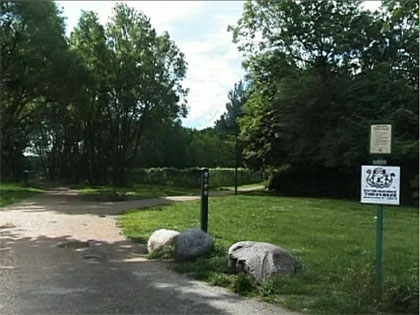
Virtual
walk at Amager Faelled
An interview with Jon Paludan
The
area of Amager Faelled lies quite close to the centre of the city
of Copenhagen. It is a somewhat desolate area consisting partly
of grassy meadows and labyrinthic shrubbery. Jon Paludan
is the initiator of the internet project Virtuel
vandring paa Amager Faelled, which translates to Virtual
walk at Amager Faelled. This project gives the user the possibility
to explore a large number of artworks distributed in a virtual version
of Amager Faelled. The interface that makes it all possible is the
Quicktime VR tool, which has been used to create 360 degree panoramic
views of a number of localities in the area. These panoramas are
linked so the user can navigate thrugh the area. All
in all 20 artists have contributed with artworks, all of which can
be found in the virtual version of Amager Faelled. Thomas Petersen had a talk with Jon about the project.
Click here to
go to the project page: www.virtuelvandring.dk.
Note:
while some of the content is in Danish, this is not the case for
most of the projects.
Participating
artists:
Lone Bank, Thomas Bech Frandsen, Tarje Gullaksen, Anette Hoejlund,
Eske Kath & Jesper Just, Tommy Làadal, Marie Markman,
Camilla Noergaard, Petri Raappana, Lars Rank, Nikolaj Recke, Nis
Roemer, Marie Roemer Westh, Marika Seidler & Seimi Noerregaard,
Mads Steen, Lisa Stroembeck and Morten Soekilde. The interface
is made by Jon Paludan.
You can mail Jon Paludan at: info@virtuelvandring.dk
I'd like to start off by asking you how this project came
about. What was the motivation for creating a virtual walk through
the area Amager Faelled? What triggered your interest for this particular
area?
Amager Faelled is close to where I live, and I walked a lot out
there last year. Actually it was this fantastic sensational green
grass circle that made me want to work there. But not alone. Since
I was interested in walking, the grass circle would not be enough
and this way of working with others came up, when I talked to some
of the participants and heard what part of the area they liked.
I like the possible game references to a documentation of a lot
of peoples everyday walk out of the city, still close to the centre.
Games without rules or specific controlled goals.
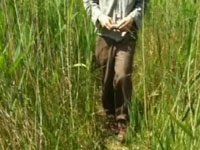 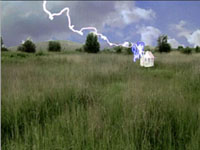
Left: Anette Hoejlund
Only I Knew. Right: Eske Kath &
Jesper Just UT (tornado).
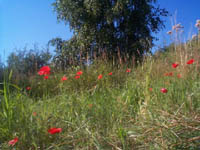 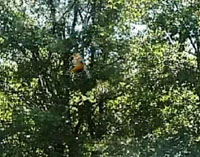
Left: Marie Markman
Valmuer. Right: Tarje Gullaksen Bogfinker.
I understand you are interested in walking as an artistic
process for example in its situationist form. It seems the informational
space is a perfect platform for this type of wandering. It is also
interesting to connect information-navigation with the metaphor
of movement through physical space. Can you tell me about your particular
intentions for using this strategy and what type of viewing experience
it can give the audience?
I guess it's the usual arty strategy to touch a border without getting
totally out on a limb. I have been looking for ways to document
or use this doing almost nothing that a walk can be, as the situationists
walked and sometimes took a cab between points, without any target.
Then this is like clicking at a map getting inside it, perhaps getting
lost in there. Most users might experience it as a labyrinth, because
there's a lot to look at. One viewer talked about how it reminded
him a bit of Wolfenstein, the ten year old game in the labyrinthian
castle. In Virtuel vandring paa Amager Faelled, there's few hotspots
to click, so it's mainly your own confusion that can get you lost.
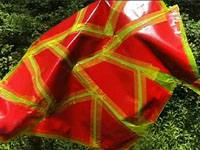 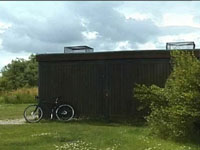
Left: Camilla Noergaard
Meanwhile back in the jungle. Right: Lars Rank
40 aar paa Amager Faelled.
A lot of the participating artists predominantly work with
non-digital art forms, that is to say they also have an art practice
off-line. Do you have any thoughts on the process of working with
the internet as an art space compared to other art spaces?
Its rewarding to use the given obstructions when you don't know
how to do this or that and got to do things different than usual.
When you work with a camera or whatever you tend to get good at
it, working with computers and gadgets for the net or off-line,
you can often use a fresh program or gadget when that happens, if
you want to. The process of historicizing is perhaps a bit more
open on the net. And then the net, and interaction with screens,
gives a different sense of joy - I can't help thinking of how computer
games also gives a special sense of happiness.
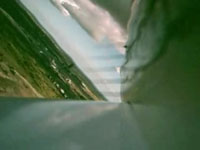 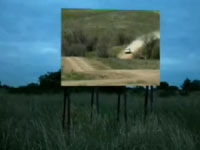
Left: Tommy Làadal
Up. Right: Thomas Bech Frandsen Eliminating
Landscape.
I think your answers point to the strengths of the computer
and internet as art media, because these technologies have many
different roles and functions other than being art machines. You
especially mention computer games as an overlapping field, which
I agree infuses the work with a sense of playfulness and joy. Tell
me more about your influences and inspirations in this direction.
Games for me are a lot about movement and simple interaction with
the screen. When something is moved things usually start to happen.
Games like The Myst series and Deer Hunter give an experience of
nature on the screen, seen through panoramas. I have played them
a bit to see how they worked. Then of course there are the obvious
classical references, the road movie and the Odyssey or Ulysses.
William Gibson has written about gaming twenty years ago. I think
it was in Neuromancer, where this guy played pinball or what it
was and just kept on, nothing could stop him. I guess it was some
kind of feeling of joy described there. That's how I understand
interaction with screens, some times you just can't stop, it just
goes on and on.
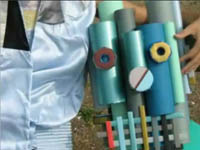 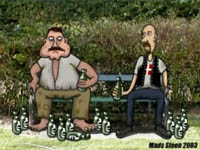
Left: Lone Bank Headless.
Right: Mads Steen Baenken.
The different projects seem to add new layers of meaning
to the localities they are situated in. To me there's an obvious
possibility of a feedback to the perception of the specific places
- I know Amager Faelled won't be the same, the next time I visit.
Did the process of working with the place also change your view
of Amager Faelled?
In previous projects I have experienced landscapes as computer games
after I filmed them. It's not so bad this time...
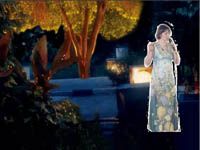 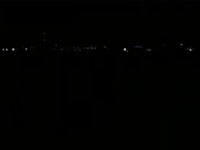
Left: Marika Seidler
& Seimi Noerregaard Sleep in Trees.
Right: Nikolaj Recke Human Fireflies.
Can you tell me something about which direction you will
be going in after this project?
I try to raise money to work with mainstream mobility together with
Nis Roemer, who's interested in what could be called radical geography.
Fancy gadgets go screen skating to save the world.
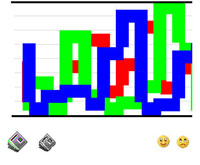 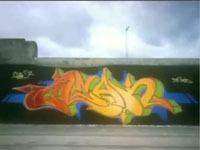
Left: Petri Raappana Sex
it up. Right: Marie Roemer Westh Oersted
Free Space.
Are there any links to internet artworks you can recommend?
I'm not much of an art link master, but I just got this link, which
seems to be of some relevancy for my thing with mobility and walking,
http://www.ambienttv.net/telejam/3/
sings streets in to existence. And this summer of psychogeography
at http://www.socialfiction.org/psychogeography/index.html.
This last link to The Center for Land Use Interpretation http://clui.org/
its an American site for artists' work with landscapes.
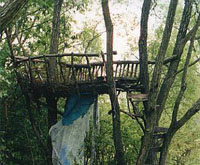 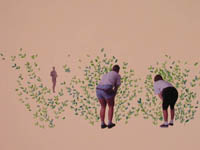
Left: Nis Roemer
Amager Faelled Wiki. Right: Lisa Strömbeck
Peepers.
|